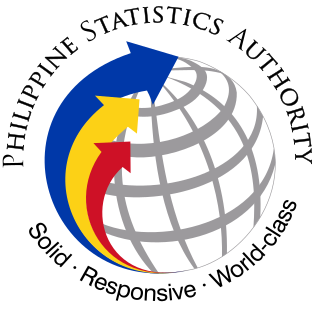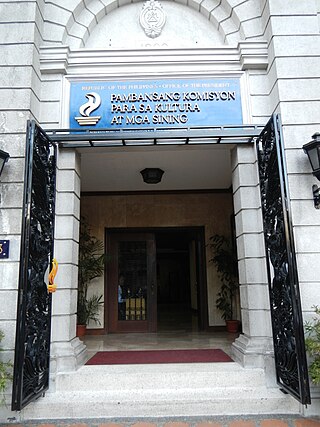
Philippine Amusement and Gaming Corporation is a government-owned and controlled corporation established in 1977 through the Presidential Decree No. 1869. PAGCOR is the Philippines' largest contributor of revenue to the government after the Bureau of Internal Revenue and the Bureau of Customs.

The Philippine Statistics Authority is the central statistical authority of the Philippine government that collects, compiles, analyzes, and publishes statistical information on economic, social, demographic, political affairs, and general affairs of the people of the Philippines, as well as enforcing the civil registration functions in the country.

Overseas Filipino Worker (OFW) is a term often used to refer to Filipino migrant workers, people with Filipino citizenship who reside in another country for a limited period of employment. The number of these workers was roughly 1.77 million between April and September 2020. Of these, female workers comprised a larger portion, making up 59.6 percent, or 1.06 million. However, this number declined to 405.62 thousand between 2019 and 2020.

The National Commission for Culture and the Arts of the Philippines is the official government agency for culture in the Philippines. It is the overall policy making body, coordinating, and grants giving agency for the preservation, development and promotion of Philippine arts and culture; an executing agency for the policies it formulates; and task to administering the National Endowment Fund for Culture and the Arts (NEFCA) – fund exclusively for the implementation of culture and arts programs and projects.

The National Intelligence Coordinating Agency (NICA) is the primary intelligence gathering and analysis arm of the Government of the Philippines in charge of carrying out overt, covert, and clandestine intelligence activities. The NICA directs, coordinates, and integrates all intelligence activities, both foreign and domestic, concerning national security, serving as the leading intelligence collector of the national government, focusing on the country's strategic intelligence requirements. It is mandated to prepare intelligence estimate on local and foreign situation for the formulation of national security policies by the President and the National Security Council.

The Philippines' Department of Social Welfare and Development is the executive department of the Philippine Government responsible for the protection of the social welfare of rights of Filipinos and to promote the social development.

The Department of Science and Technology, is the executive department of the Philippine government responsible for the coordination of science and technology-related projects in the Philippines and to formulate policies and projects in the fields of science and technology in support of national development.

The Philippines' Bureau of Plant Industry, is an agency of the Philippine government under the Department of Agriculture responsible for serving and supporting the Philippine plant industry sector.

The Philippine Fiber Industry Development Authority or PhilFIDA is an agency of the Philippine Department of Agriculture responsible for promoting the accelerated growth and development of the fiber industry in the Philippines, such as abaca, also known as Manila hemp and cotton.

National Nutrition Council, abbreviated as NNC, is an agency of the Philippine government under the Department of Health responsible for creating a conducive policy environment for national and local nutrition planning, implementation, monitoring and evaluation, and surveillance using state-of the art technology and approaches.

Juan Edgardo "Sonny" Manalang Angara is a Filipino politician and lawyer serving as a Senator since 2013. He is the principal author and sponsor of Republic Act No. 11981 also known as the Tatak Pinoy Act, a landmark law for establishing a policy platform for the public and private sectors to collaborate to help domestic enterprises become more globally competitive and offer more diverse and sophisticated products and services. He is also the chairman of Samahang Basketbol ng Pilipinas, the governing body of basketball in the Philippines.

Filipino Sign Language (FSL) or Philippine Sign Language, is a sign language originating in the Philippines. Like other sign languages, FSL is a unique language with its own grammar, syntax and morphology; it is not based on and does not resemble Filipino or English. Some researchers consider the indigenous signs of FSL to be at risk of being lost due to the increasing influence of American Sign Language.

Esther Margaux Justiniano Uson, better known as Mocha Uson, is a controversial Filipino singer, actress, dancer, model, political blogger, and public official widely known for spreading fake news and disinformation. She is also a co-founder of the group Mocha Girls.

Rosalinda Dimapilis-Baldoz is a Filipina lawyer, civil servant, and labor arbiter. She served as Secretary of the Department of Labor and Employment (DOLE) of the Philippines under the administration of President Benigno Aquino III.
The labor migration policy of the Philippine government allows and encourages emigration. The Department of Foreign Affairs, which is one of the government's arms of emigration, grants Filipinos passports that allow entry to foreign countries. In 1952, the Philippine government formed the Philippine Overseas Employment Administration (POEA) as the agency responsible for opening the benefits of the overseas employment program. In 1995, it enacted the Migrant Workers and Overseas Filipino Act in order to "institute the policies of overseas employment and establish a higher standard of protection and promotion of the welfare of migrant workers and their families and overseas Filipinos in distress." In 2022, the Department of Migrant Workers was formed, incorporating the POEA with its functions and mandate becoming the backbone of the new executive department.

The Philippine Overseas Employment Administration was an agency of the government of the Philippines responsible for opening the benefits of the overseas employment program of the Philippines. It is the main government agency assigned to monitor and supervise overseas recruitment and manning agencies in the Philippines. The POEA's office is located at EDSA corner Ortigas Avenue, Mandaluyong, Philippines.

National Heroes Day is a holiday in the Philippines dedicated to Filipino Heroes. It is a public holiday in the Philippines.

The Cabinet Secretariat, formerly the Office of the Cabinet Secretary, was a member agency of the Cabinet of the Philippines which provided support to the President, facilitated the exchange of information, as well as discussed and resolved issues among Cabinet members. The Cabinet Secretary also acted as a coordinator and integrator of the initiatives of the President. The Cabinet Secretariat was created through Executive Order No. 237, s. 1987.
Throughout the COVID-19 pandemic, the national and local governments of the Philippines have coordinated numerous international and domestic evacuations.

The Department of Migrant Workers is the executive department of the Philippine government responsible for the protection of the rights and promote the welfare of Overseas Filipino Workers (OFW) and their families. The department was created under the Department of Migrant Workers Act that was signed by President Rodrigo Duterte on December 30, 2021. The functions and mandate of the Philippine Overseas Employment Administration (POEA) will serve as the backbone of the department and absorbing the seven offices of the Department of Labor and Employment (DOLE) and Department of Foreign Affairs (DFA) namely the Office of the Undersecretary for Migrant Workers' Affairs (OUMWA) of the DFA, Philippine Overseas Labor Office (POLO), International Labor Affairs Bureau (ILAB), National Reintegration Center for OFWs (NRCO) and the National Maritime Polytechnic (NMP) of the DOLE. The Overseas Workers Welfare Administration will serve as its attached agency and the DMW secretary will serve as the concurrent chairperson of OWWA.


















